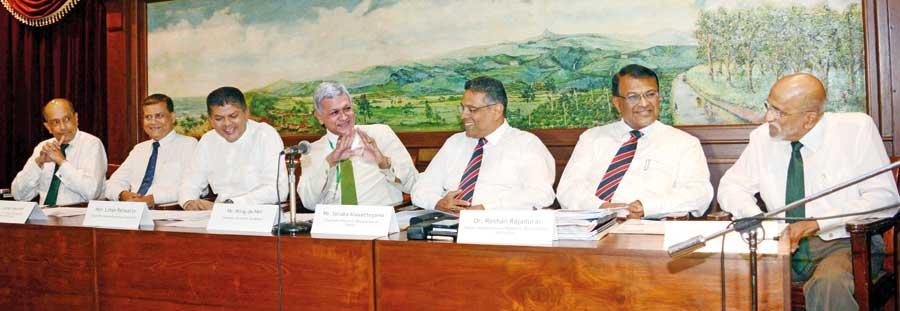Reply To:
Name - Reply Comment

From left: Colombo Brokers’ Association Chairman Anil Cooke, Sri Lanka Tea Factory Owners’ Association Chairman Lionel Herath, State Minister of Plantation Industries Lohan Ratwatte, Sri Lanka Tea Board Chairman Niraj de Mel, Planters’ Association of Ceylon Chairman Senaka Alawattegama, Planters’ Association Media Spokesperson,
Dr. Roshan Rajadurai, Colombo Tea Traders’ Association Representative Anslem Perera - Pic by Pradeep Pathirana
Local and international media highlighting the plight of the estate sector workers, particularly in light of the economic crisis, have adversely impacted the reputation of Sri Lanka’s tea industry, as an incorrect portrayal of their living conditions has been painted to the world, the country’s tea industry stakeholders said.
They stressed that the Regional Plantation Companies (RPCs) have done more than required on a voluntary basis for the plantation workers, and any negligence taking place in the overall estate sector cannot be pinned on them.
The tea industry stakeholders, including the state-run Sri Lanka Tea Board, asserted that the “rampant misinformation” in circulation has caused a lot of harm and has put the industry’s reputation at stake.
“There has been a lot of misconception about the way we look after our workers. We have two sets of producers in the country. We talk of one aspect and blow it up without giving two hoots about who’s getting affected in the process,” Sri Lanka Tea Board Chairman Niraj de Mel told a press conference held in Colombo yesterday.
“As a result of that, and one or two incidents are being taken out, and the whole Sri Lanka tea industry is painted as bad boys. That is unacceptable,” he added.
Elaborating on the damage done, Planters’ Association of Ceylon Chairman Senaka Alawattegama noted that media, both local and international, have published stories that are extremely critical of the Sri Lankan tea industry, without any meaningful commitment to fact-checking, or balanced journalism.
“During their visits, they tend to speak to a handful of individuals—who are usually facilitated by trade unions. These individuals make all kinds of outlandish claims which these journalists publish in full without any attempt whatsoever to verify the truth of these claims,” he said.
Alawattegama added that the allegations span everything from “systematic illegal deductions of wages” which leaves employees with zero earnings through to allegations of “rats falling into water tanks” causing fatal illness and death of workers.
“We note with disappointment that in most cases, journalists usually spend weeks and even months gathering up these anecdotes, and yet they never engage with RPC management or industry representatives in any meaningful manner before they publish their allegations,” he said.
Pointing out that these “lax standards” are nothing new, in the context of a global economic downturn, and the worst economic crisis in Sri Lanka’s entire recorded history, such “weak commitment to truth” is severely damaging to tea industry, and all those whose livelihoods depend on it.
“All that we ask is for a reasonable standard of accuracy, fairness and objectivity to be applied evenly in your reporting regardless of whether you are speaking to the industry or taking comments from politicians and other stakeholders.
We feel it is a reasonable request that when you produce stories that are critical of our industry, that you at least engage in a good faith discussion with all stakeholders, specially those that you are criticising,” said Alawattegama.